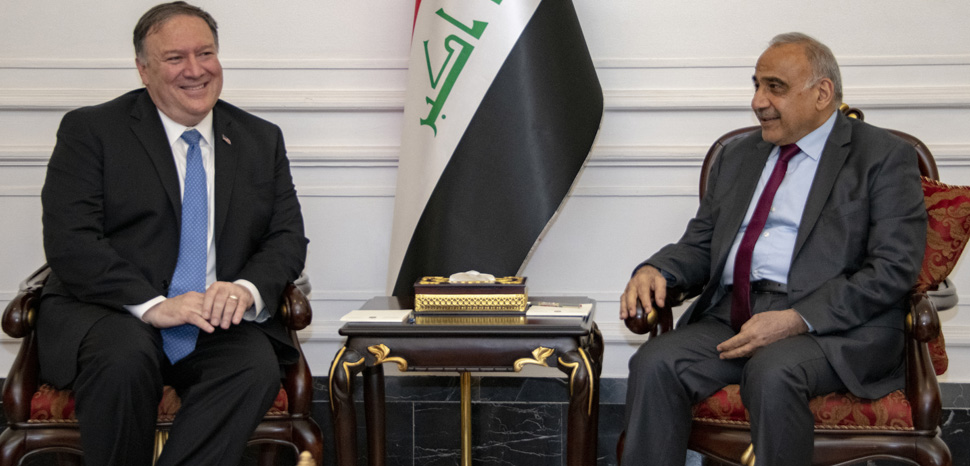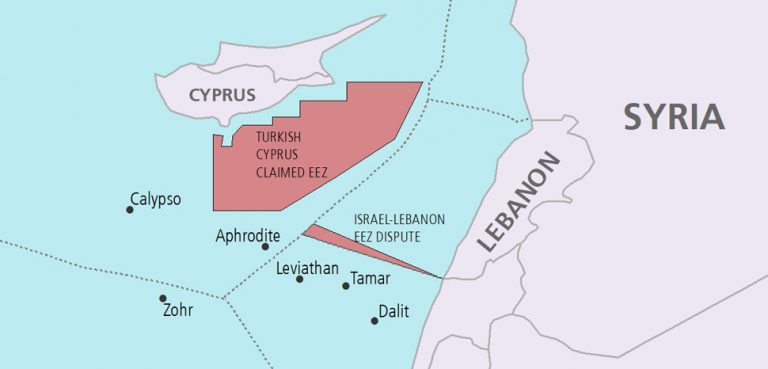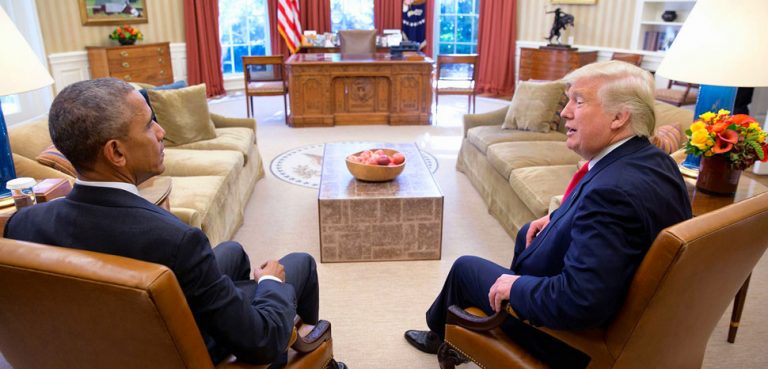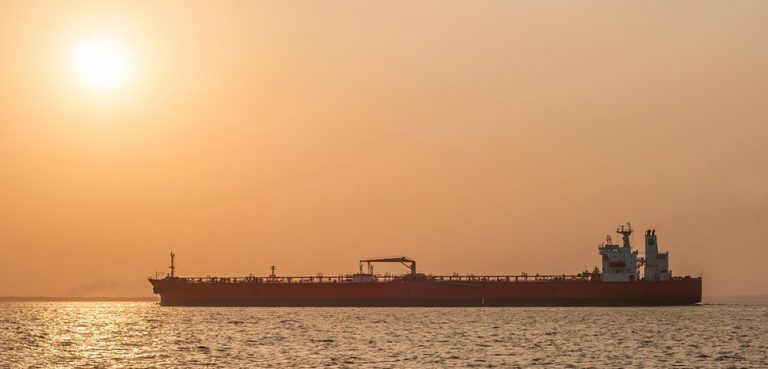Iran is attempting to ease the economic pain of US sanctions by developing closer economic ties with its neighbor Iraq, which could leave America’s fragile Middle East ally falling increasingly under Iranian influence.
Iraq sees itself as a regional economic hub, establishing good trading relations with all its neighbors, and has stressed that it does not want to be part of any international or regional axes. Yet Tehran’s growing commercial relations with Baghdad may strengthen the Iranians’ already significant political leverage.
Sweeping US sanctions against Iran imposed last year after Washington’s withdrawal from the international nuclear agreement – which granted Tehran sanctions relief in exchange for curbing its atomic energy program – have caused considerable harm to Iranian finances.
The US was critical of the Joint Comprehensive Plan of Action for failing to address Iran’s ballistic missile program and “malign influence” across the Middle East. But the Trump administration’s ability to pressure Iran into addressing these issues as part of a renegotiation of the nuclear deal may be hindered by gaps in its sanctions regime.
For Tehran, Iraq’s dependence on Iranian gas, electricity, refined petroleum products and non-energy exports generates revenue streams that help it to limit at least some of the economic damage resulting from American trade and investment restrictions. Washington cannot do much to reduce Baghdad’s reliance on its neighbor. Pressuring it to do so risks destabilizing the politically volatile country, just as it recovers from the devastation wrought by Islamic State.
America has little option but to continue extending sanctions waivers for Iraqi purchases of Iranian electricity and gas to supply its generators because of the poor condition of Iraq’s power-generation facilities. The US wants Baghdad to wean itself off Iranian energy, but Iraqi officials say it could take several years to find alternative sources. It may take just as long to fix the country’s electricity infrastructure.
The critical importance of Iranian energy was underlined last summer when Iraq’s failure to pay its bills prompted Iran temporarily to shut off supplies, leaving many Iraqis with limited air conditioning as temperatures soared. The suspension contributed in part to rioting in the oil-rich yet impoverished Basra region, where locals also protested over corruption and the lack of drinking water and jobs.
Overall, bilateral trade between the two countries is growing. Valued at $12 billion, three quarters comprised Iranian exports for the period March 2018 to March 2019 – a year-on-year increase of 36 per cent. The sanctions-induced fall in the value of the rial has contributed to the rise by making Iranian goods cheaper.
Tehran is hopeful that bilateral trade could increase to $20 billion in the coming years. Iraq is Iran’s second-biggest non-oil export destination after China, with Iranian merchants reportedly seeing Iraq as potentially replacing Dubai as a conduit through which their international trade could be channelled. Indeed, the Iraqi president Barham Saleh has spoken of his country becoming “the heart of a new Silk Route to the Mediterranean.”
Planned Iraqi-Iranian projects aimed at boosting commercial links include the setting up of industrial parks along their borders; the development of the Naft Shahr and Khorramshahr natural gas fields; the dredging of Shatt al-Arab waterway to facilitate shipping and provide clean water for Basra province; and the linking of the Iraqi and Iranian railway networks as part of a wider plan to enable Iran to transport goods to Syria and its Mediterranean ports.
In order to ensure economic cooperation does not run the risk of violating American sanctions, the two countries are reportedly setting up a non-dollar payment system similar to Europe’s special purpose vehicle, INSTEX, established to allow European companies to do business in Iran without incurring US penalties. Iranian conservatives are said to be pressing their government to rely more on Iraq than the Europeans. Tehran appears to be losing hope in the latter engaging, with good reason – the risks of being penalized by the US are too high for many.
Washington is no doubt monitoring Iran-Iraq business ties closely for sanctions infractions, recently penalizing a Baghdad-based company for allegedly trafficking hundreds of millions of dollars’ worth of weapons to Islamic Revolutionary Guard Corps (IRGC)-backed Iraqi militias. Last year, an Iraq-based bank was sanctioned for alleged involvement in the funneling money on behalf of the IRGC to Iranian-backed Hezbollah in Lebanon. Iraq does not want to put its relations with the US at risk by serving as a sanctions-busting front for Iran, notably informing the Iranians that the planned joint railway project must be under Iraqi supervision and cannot be used to break the US embargo.
Yet the Iraqi government may struggle to curb commercial links with sanctioned entities in Iran given that the pro-Tehran Fatah Alliance, representing Iranian-backed Iraqi militias, the Popular Mobilisation Units, which played a critical role in defeating ISIS, is the second-largest group in the Iraqi parliament. Significantly, a spokesman for Fatah condemned the US decision in April to sanction the IRGC.
For the US, there is also the risk that if it were to escalate its conflict with Iran, Tehran might enlist its allies in Iraq to trigger a proxy war against American interests, unraveling efforts to stabilize the country. In May, as tension between Washington and Tehran rose over attacks on Saudi oil tankers and energy infrastructure, non-essential US diplomatic staff in the country were evacuated. Days later, a rocket hit a government compound in the center of Baghdad where foreign government offices, including the US embassy, are based.
Iraqi politicians are divided over the country’s ties with Iran. Fatah’s rival is Sairoon, part of the largest coalition in parliament, led by the nationalist cleric Muqtada al-Sadr, who is vehemently opposed to both American and Iranian influence in the country. But given the strong likelihood that US sanctions against Tehran will deepen, Iran will probably look to expand its economic ties with Iraq to offset the impact of the embargo. And given the poor state of its economy, Baghdad would be in no position to resist.
At present, the Iraqi government is trying to remain as even-handed as possible in its dealings with the US and Iran, though in time greater reliance on the latter may tip the balance of power in Iraq in favor of pro-Iranian factions, especially if the US penalizes more Iraqi companies for breaking the Iran embargo and restricts, or ends, its sanctions waivers.
Yigal Chazan is the head of content at Alaco, a London-based business intelligence consultancy. The views expressed in this article are those of the author alone and do not necessarily reflect Geopoliticalmonitor.com or any institutions with which the author is associated.




